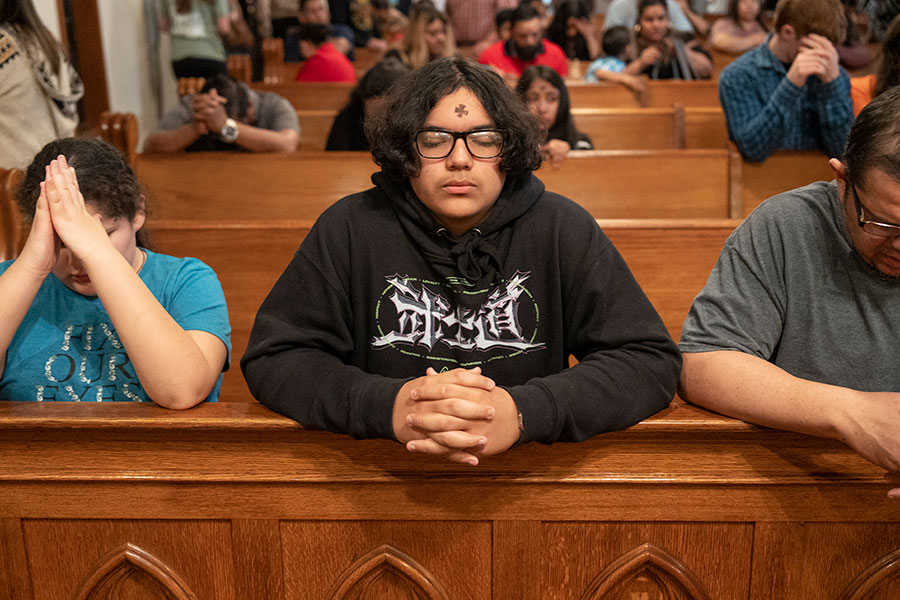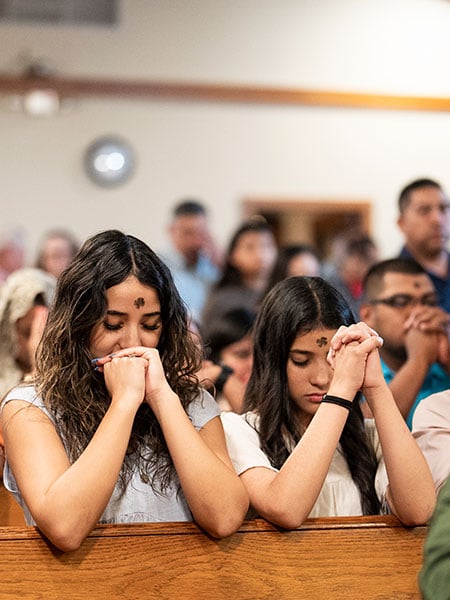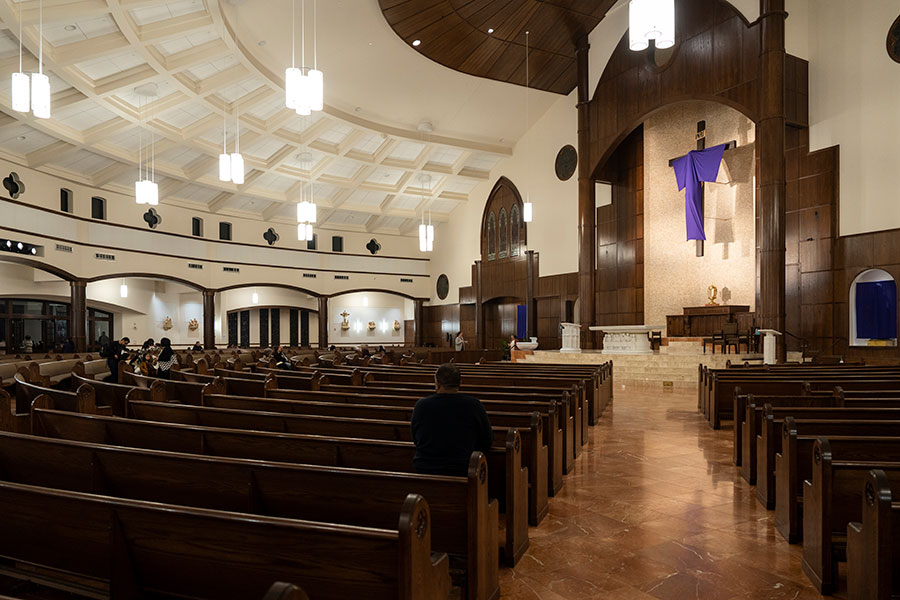Leaning into Lent: New approaches to old traditions of fasting, prayer, and almsgiving

A young man prays alongside his family after Ash Wednesday Mass at St. Rose of Lima Parish in Glen Rose Feb. 22, 2023. (NTC/Juan Guajardo)
Holiday wreaths and ornaments were just taken down, people are still vacuuming up pine needles left behind by the Christmas tree, and it’s already time to start thinking about Lent.
Ash Wednesday falls on Feb. 14 — Valentine’s Day in 2024. The onset of the penitential season is early, coming a scant 12 days after Candlemas, the Feast of the Presentation of the Lord, on Feb. 2. Some Catholics consider Candlemas the official end of Christmas.
Entering into a time of fasting and sacrifice after weeks of celebration can be difficult, observed Jodi Hunt, executive director of the Neuhoff Institute for Ministry and Evangelization at the University of Dallas. But there are strategies to make the transition easier.
“Our liturgical seasons are set up in a way that allows you to lean in and lean back. If you embrace the idea that Christmas is a time to wind down, it prepares you for the desert of Lent a little bit more,” she advised.
The seasoned theology professor admitted giving up simple pleasures like chocolate or coffee while coping with chilly winter weather and post-holiday letdown can become overwhelming for some people.
“When Lent comes up so quickly [after Christmas], I tell people to think of it as a time of discernment and quiet solitude rather than a period of ‘I can’t have this or that,’” Hunt continued. “Think of ways you can disengage [from the secular world] and embrace God’s love in a way that renews you. Lean into what the season offers and evaluate where you are spiritually.”
A colleague of the educator turns off her phone every Sunday after Mass until sundown. Disconnecting from social media for those few hours was “life-changing” for her friend.
Giving up social media is a popular and positive Lenten practice, she said, adding, “scrolling on your phone is a mindless activity and you forget how those behaviors consume you.”
Other people the director knows give up meat entirely during Lent or impose dietary restrictions that allow them to engage in the season sacrificially. One former co-worker declined invitations to parties and another avoided shopping trips. Some of her friends turn off the car radio and travel to work in silence to prompt moments of meditation.
“It [a Lenten practice] doesn’t have to be anything monumental — just small, daily life things as long as they are intentional,” she pointed out. “Be creative. Use what you do to engage God and really think about Him.”

And if life circumstances prevent “giving up” something physically, Hunt encouraged “giving more” during Lent. The traditional pillars of Lent include prayer and almsgiving along with fasting.
“Decide this year you’re going to be more fruitful by saying a daily Rosary or going to daily Mass,” she suggested. “Volunteer for a ministry or increase tithing. Don’t box yourself into spending Lent the same way every year. It really is a spiritual process.”
Some people just naturally lean into the sacrificial life, but others shouldn’t feel “less than” if they’re unable to do that.
“The season is different for every single person and that’s okay,” Hunt explained. “As long as you’re prayerfully discerning, exploring, and thinking through how you can connect to God during this important time, it’s all He’s asking you to do.”
Lenten customs and traditions
During Lent, Catholics worldwide unite in ways that help them contemplate the suffering of Christ through prayer and selfless acts. Aside from the days of fasting and abstinence mandated for the universal Church, there are devotions and ethnic customs unique to different countries and cultures during the penitential season.
In the Maronite Catholic Church, the Season of Great Lent begins on Ash Monday, a day of fasting that requires members to abstain from eating and drinking (except water and medicine) from midnight until noon. The rest of the day’s normal meals can be taken without meat.
Many Maronite Catholics of Lebanese heritage continue to adhere to the Church’s traditional Lenten dietary restrictions that include eliminating fish, dairy, and eggs from their meals along with meat. Members are exempt from fasting and abstaining on Saturday, Sunday, and feast days. During the week, cooked meals are vegetarian or vegan.

Residents of Mexico celebrate Día de La Samaritana on the fourth Friday of Lent by giving away water, ice cream, and fruit to passersby as a way of remembering the Samaritan woman who gave Jesus water at the well.
Another Lenten custom is devoted to the Blessed Virgin. Known as Viernes de Dolores or Friday of Sorrows, the people of Mexico prepare altars with images of Calvary at the entrance of their homes on the Friday before Palm Sunday. The altars are filled with lit candles or fire pots to represent the immense pain the Blessed Virgin experienced during the passion and death of her son.
Holy water, for use in blessing homes, is traditionally passed out during Lent in Italy. In Bermuda, families fly kites made with wooden sticks on Good Friday to symbolize both the cross Jesus died on and His Ascension.
Members of the Dominican Sisters of Mary Immaculate came to Fort Worth in 2011 bringing with them many of their Vietnamese customs and traditions. During Lent, the religious order follows Church teaching by engaging in various acts of prayer, fasting, and almsgiving along with some special practices.
“We have Stations of the Cross every Friday rather than one Friday a month, which is what we do during Ordinary Time,” said Dominican Sister Anne Frances Ai Le. “Spiritually, each sister strives to do extra prayers of choice to grow closer to Christ.”
As a community, the congregation eats no meat on Wednesdays in addition to small meatless meals on Fridays.
“At the end of Lent, the money that is saved from those meals is donated to a particular cause or family in need,” disclosed the sister, who works as assistant director of intellectual formation in the diocesan permanent diaconate program.
The educator thinks Christians shouldn’t think of Lent only in terms of sacrifice and drudgery.
“The purpose of Lent is to cultivate virtues — not just give up things,” Sr. Anne Frances explained. “Put into practice good habits and spiritual exercises. That’s what helps us conform to Christ.”

Teaching how to give
Learning about the Lenten practices of almsgiving, fasting, and prayer starts early at St. Philip the Apostle Parish in Flower Mound.
Students in kindergarten through 12th-grade religious education programs support two charities with their prayers and donations — the Haitian Pilgrims and the Divine Face in Nigeria.
“It’s important for any Catholic parent to help their child understand what it means to be Catholic and giving, especially during Lent. Knowing the three practices of Lent is a huge lesson to learn,” said Kim Carr, director of elementary formation. “Teaching these habits when a child’s heart is young and pure helps them as they age and go into adulthood.”
Each Lent, the youngsters and teens are asked to abstain from a favorite food, activity, or shopping and put the money saved into a special alms box.
“One child started a lemonade stand. Her mother put it on social media, and she raised $500,” enthused the seasoned catechist who’s worked at the parish 17 years. “Another child held a family art show, sold her art, and donated the money. We encourage them to be inventive.”
Last year, students raised $2,600 which was split evenly between both charities. Praying the Haitian and Nigerian youngsters can have a better life is part of the project.
“It helps them understand all the things we take for granted that these children don’t have: food, shelter, education, and clothing,” Carr explained. “Their faces are priceless when we count and sort the money at the last class before Easter. They’re always so happy to know we’re helping other children.”
Making Lent meaningful
The late Pope Benedict XVI called observing Lent “the very badge of Christian warfare … Should mankind grow remiss in its observance of Lent, it would be a detriment to God’s glory, a disgrace to the Catholic religion, and a danger to Christian souls.”
Want to make Lent more meaningful and positive? Try these suggestions:
- Read the Gospel of Mark; the most concise story of Jesus’ life.
- As part of almsgiving, learn more about a particular social issue like human trafficking, child poverty, or racism. Donate money to an organization that supports the dignity of the human person.
- Contact important people in your life you’ve lost touch with over the years. Make 40 phone calls.
- Join or start a spiritual book club.
- Become inspired by the Corporal Works of Mercy as described in Matthew 25:31-46. Choose an act of service.
time to start thinking about Lent, Lent, trending-english
